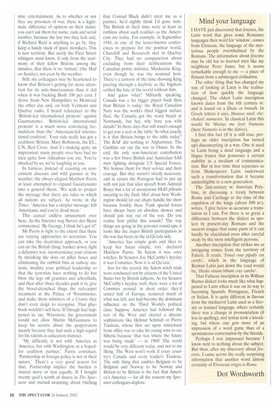Mind your language
HAVE just discovered that fenestra, the Latin word that gives some Romance languages their word for 'window', comes from Etruscan, the language of the mysterious people overwhelmed by the Romans. The information about fenestra may be old hat to learned men like my neighbour Peter Jones, but it seems remarkable enough to me — a piece of flotsam from a submerged civilisation.
The other thing that has changed my way of looking at Latin is the realisation of how quickly the language changed. The oldest Latin inscription known dates from the 6th century BC and is found on a fibula or brooch. In Greek letters it says, Manios: med: vhe: vhaked: numasioi. In classical Latin this would be Manius me fecit Numerio (here Numeric is in the dative).
I find this fact (if it is still true; perhaps an older inscription has turned up) disconcerting in a way. One is used to Latin being a dead language and a lingua franca that possesses a certain stability as a medium of communication. But in less time than separates us from Shakespeare Latin underwent such a transformation that it became unintelligible to a new generation.
The 2nd-century BC historian Polybius, in discussing a treaty between Rome and Carthage at the time of the expulsion of the kings (about 500 BO, writes, 'I give below as accurate a translation as I can. For there is so great a difference between the dialect as spoken by present-day Romans and the ancient tongue that some parts of it can hardly be elucidated even after careful study by the most intelligent persons.'
Another inscription that strikes me as intriguing comes from the territory of Falerii. It reads, Toied vino pipafo cra carefo', which in the language of Roman Latin just down the road would be, Wodie vinum bibam cras carebo'.
That Faliscan inscription in its William Barnes dialect looks much like what happened to Latin when it was on its way to becoming Spanish, Portuguese, French or Italian. It is quite different in flavour from the mediaeval Latin used as a literary or learned language, where certainly there was a change in pronunciation (if less in spelling), and syntax took a knocking, but where one gets more of an impression of a word game than of a spontaneous conversation by the fireside.
Perhaps I was impressed because I know next to nothing about the subject. But then, after my discovery about fenestra, I came across the really surprising information that another word almost certainly of Etruscan origin is Rome.
Dot Wordsworth


















































































 Previous page
Previous page